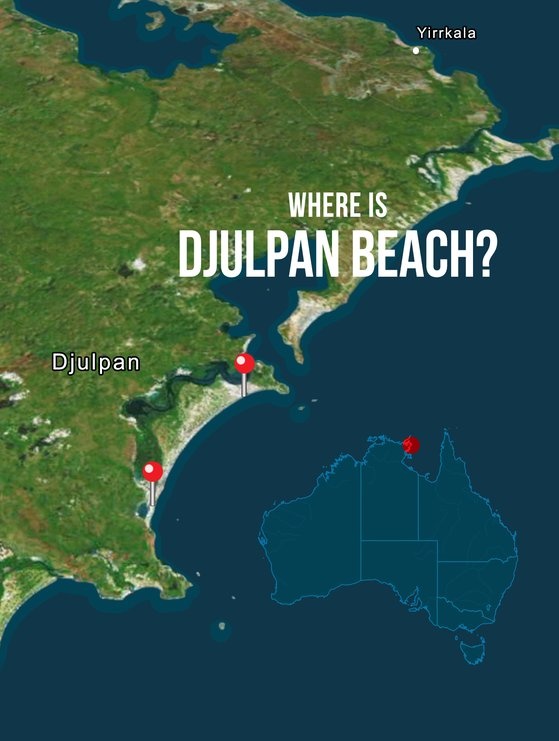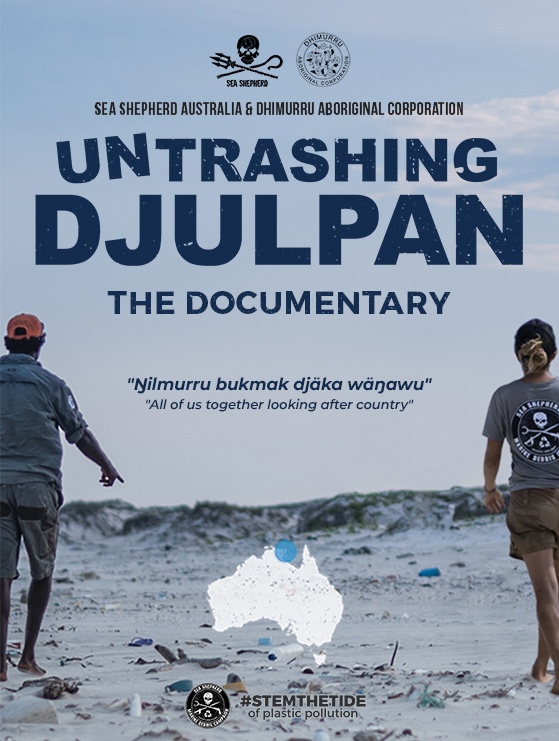Sea Shepherd's Remote Beach Clean-ups in Arnhem Land
Untrashing Djulpan
Since 2018, Sea Shepherd and the Dhimurru Aboriginal Corporation of Northeast Arnhem Land have joined forces three times to clean Djulpan, a sacred and remote 14km stretch of beach in the Northern Territory that is an important nesting ground for turtles.

In 2018, 2019 and 2022, our volunteer Sea Shepherd crew travelled to Djulpan for our marine debris campaign with Rangers from the Dhimurru Aboriginal Corporation.
Together we aspire to remove as much plastic pollution as possible and bring immediate relief to the area, making the coastline safer for all marine life.

Djulpan is a 14km remote beach on the shores of the Gulf of Carpentaria. Far from any town or city, it is a culturally significant place for the Yolngu people.
Six of the seven species of marine turtles which are all listed as ‘Vulnerable’ or ‘Endangered’ under the Environmental Protection and Biodiversity Conservation (EPBC) Act can routinely be found on this stretch of the Gulf. Djulpan is fortunate to host marine turtles during their nesting season along the Arnhem Land coast, but this is also when they are most susceptible to entanglement from marine debris.

Djulpan is one of the beaches that falls under the Dhimurru Aboriginal Corporation’s Indigenous Protected Area. This area includes around 71 km of rugged, beautiful and remote coastline.
The Dhimurru Rangers work tirelessly to care for their country on behalf of the Yolŋgu traditional owners but increasingly are overwhelmed by the quantity of plastic pollution washing up on their cultural homelands.
The area on the western side of the Gulf of Carpentaria accumulates plastic pollution at an alarming rate. Along the coast, trash is swept onto these remote beaches which increases towards the end of the SE trade wind season.
For well over two decades, plastic has been flooding onto the coastline with no end in sight, and each year ever-increasing quantities are recorded.
“The land can also be part of us. When we see the rubbish, it hurts us. Our culture is 70,000 years and land here has been protected by the Yolngu people looking after it… Now it has changed, we are now seeing a lot of rubbish in our sea and oceans and in the sand, and our kids will grow up and see this rubbish… it’s very sad.”
- Dhimurru Managing Director Timmy (Djawa II) Burarrwanga
Untrashing Djulpan 2018
In 2018, over seven tonnes of marine plastic pollution was removed by ten volunteers from Sea Shepherd Australia and Indigenous Rangers from the Dhimurru Aboriginal Corporation in the inaugural two-week-long collaboration at Djulpan Beach in the Northern Territory.
The volume and density of plastic pollution removed from Djulpan was at a scale that the Sea Shepherd volunteers had not seen before on a mainland Australian beach, despite having facilitated over 680 clean-ups in the past three years.
Around 4.5 tonnes of the debris removed were consumer items including in many cases, the plastic items were so degraded that when volunteers went to pick them up, they crumbled into plastic dust. The remaining 2.5 tonnes was made up of 72 different types of discarded fishing nets or ghost nets, some of which contained turtle bones.
Read More about the 2018 Djulpan clean-up
2019 Arnhem Land Clean-up Campaign
When the Sea Shepherd crew and Rangers returned to Djulpan in 2019, they were more determined than ever to free the sacred shoreline of trash.
Despite the heat and long days together they removed over a tonne of debris a day. In total, 12.1 tonnes of debris was recorded including consumer plastics and large fishing nets from 8.5 kilometres of beach. This surpassed the previous year’s achievement of 7.1 tonnes from 4 kilometre of beach. The crew and Rangers also removed 86 nets of differing sizes and types.
Just under 75% of the rubbish was made up of household, fishing and consumer items consisting of polystyrene, drink bottles, toothbrushes, medical waste, hard plastic pieces, plastic film, thongs and rubber pieces, bottle caps, food packaging, pharmaceutical packaging, personal care items, oil bottles, household plastic items, rope scraps, squid jiggers, floats and buoys.
On many of the containers and personal care packaging recycling symbols were clearly shown which demonstrates that a product may be recyclable but is not being collected and processed. Fishing nets made up 25% of the weight of the debris removed.
2022 Arnhem Land Clean-up Campaign
In October 2022, Sea Shepherd volunteers joined Dhimurru Aboriginal Corporation rangers for a third year, to help remove plastic pollution washing up on Djulpan’s sacred shores.
Over 10 days, 11 volunteers removed a shocking 10-tonnes of trash across just 4.5km of remote beach, and returning volunteers said it was the worst they had ever seen.
On average, every meter of beach was being crushed by more than two kilos of plastic. In some parts, the sheer density of trash called for the use of shovels and rakes.
Along with plastic pieces and household items, hundreds of kilograms of lethal fishing nets were pulled from the rocks and sand. In 2019, volunteers removed all of the fishing nets from the same stretch. In 2022, more than a tonne had returned.
Read more about the 2022 clean-up
View our photo slideshow from our ongoing collaboration with Dhimurru Rangers to clean-up Djulpan
Sea Shepherd and Dhimurru are working together for the good of the oceans with their partnership becoming stronger and the outcomes greater.
